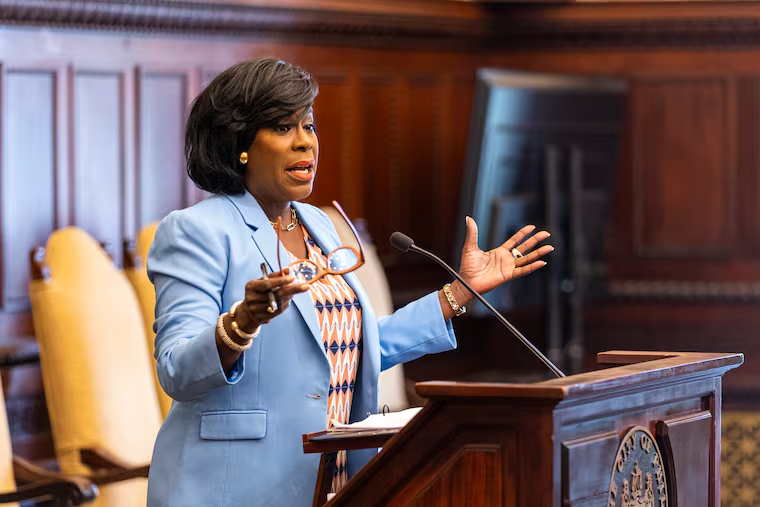Philly’s bump stock ban faces a lawsuit just days after it was signed into law
Lawyers for two gun owners argue the city is not legally allowed to regulate firearms and that the law is too vague.

Lawyers for two Philadelphia gun owners filed a lawsuit Thursday challenging the city’s days-old law banning rapid-fire gun devices known as “bump stocks,” a move that rekindles a decades-long debate about whether the city can enact its own gun regulations.
The plaintiffs — Philadelphia residents Vern Lei and Ross Gilson — sued the city in federal court, saying municipalities are prohibited under Pennsylvania law from creating and enforcing local gun laws that are stricter than the state’s.
Philadelphia has repeatedly and unsuccessfully tried to pass its own gun legislation and overturn state law that prohibits the city from doing so. Those efforts have led to multiple court decisions blocking other local regulations, including a ban on assault weapons and a prohibition on guns in parks and recreation centers.
“The city has been told over and over again that it cannot regulate the lawful possession of firearms,” said Daniel J. Auerbach, an attorney for the plaintiffs. “It keeps doing it, even though there is court decision after court decision saying that it can’t.”
While the city expected to face a legal challenge over the law, the suit nonetheless represents one of the first big legal battles of new Mayor Cherelle L. Parker’s tenure. The Democrat championed the legislation as a necessary move to improve public safety in the city, and she held a special event Tuesday to publicly sign it just days after the U.S. Supreme Court struck down a federal ban on bump stocks.
The local law, which passed through City Council unanimously, bars anyone in Philadelphia from manufacturing or buying devices that are designed to accelerate how fast a semiautomatic gun can fire. That includes bump stocks, which are meant for rifles, and “switches,” which can be attached to handguns.
A spokesperson for Parker said in a statement that the administration “strongly supports” the ordinance and “will do whatever it takes to keep Philadelphians safe from gun violence.” The mayor’s office declined to comment on the specifics of the lawsuit.
Auerbach and attorney Andrew B. Austin wrote in court papers that the city is banning lawful gun possession in violation of both the Second Amendment and state law that generally blocks the city from writing its own gun regulations.
» READ MORE: Judge bars Philadelphia from enforcing Mayor Jim Kenney’s ban on guns at rec centers and playgrounds
The law, known as preemption, states that “no county, municipality, or township may in any manner regulate the lawful ownership, possession, transfer, or transportation of firearms, ammunition, or ammunition components when carried or transported for purposes not prohibited by the laws of this commonwealth.”
The attorneys also argued that the bump stock ban as written is vague and could result in “arbitrary enforcement.” Auerbach said other lawful gun accessories and parts could be inadvertently captured by the city’s law, which bans any device “that is designed to accelerate the rate of fire of a semiautomatic firearm.”
“That language is so badly designed that no one who knows anything about guns has any idea what the city is talking about,” he said.
Auerbach also pointed out that there is no exception for members of law enforcement who may possess government-issued devices now illegal under the city’s law.
A spokesperson for the Philadelphia Police Department said officers don’t have bump stocks or handgun switches, but some SWAT rifles include a part called an “auto sear” that allows for fully automatic firing. The legislation includes a ban on auto sears.
Gun-rights organizations including the National Rifle Association and Gun Owners of America have in the past organized lawsuits against Philadelphia laws regulating firearms, but Auerbach said the suit filed this week was not funded by an interest group.
The suit does not reference last week’s Supreme Court decision that struck down a federal ban on bump stocks, which was implemented by the Bureau of Alcohol, Tobacco, Firearms and Explosives under former President Donald Trump after a 2017 mass shooting in Las Vegas left 60 people dead.
The high court’s ruling applied to the ATF regulation, whereas the local ordinance was passed by the city’s legislative branch and signed into law.